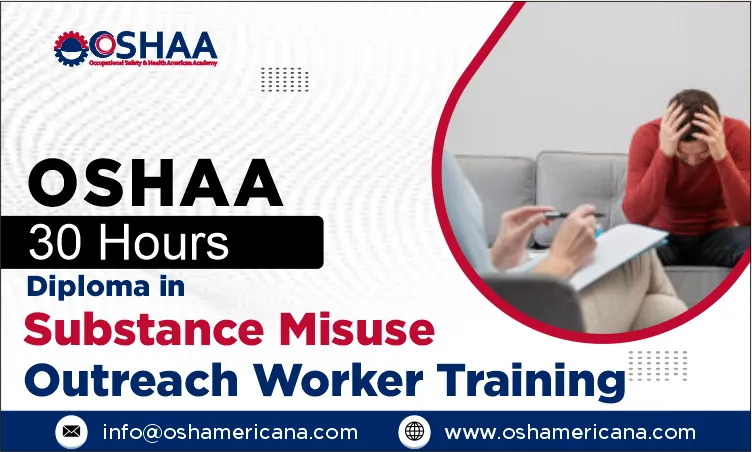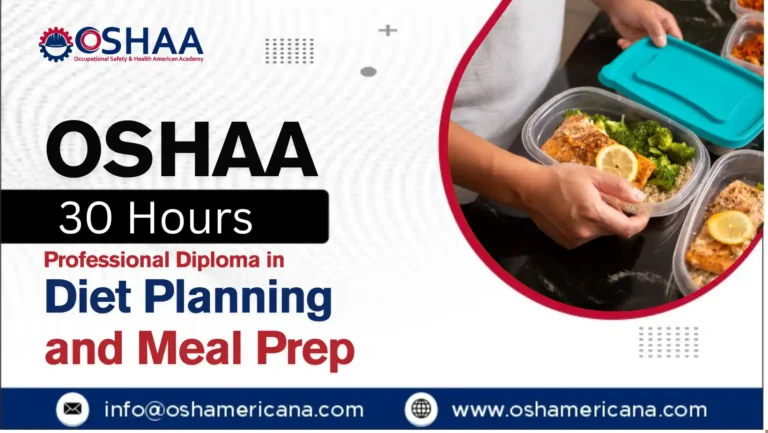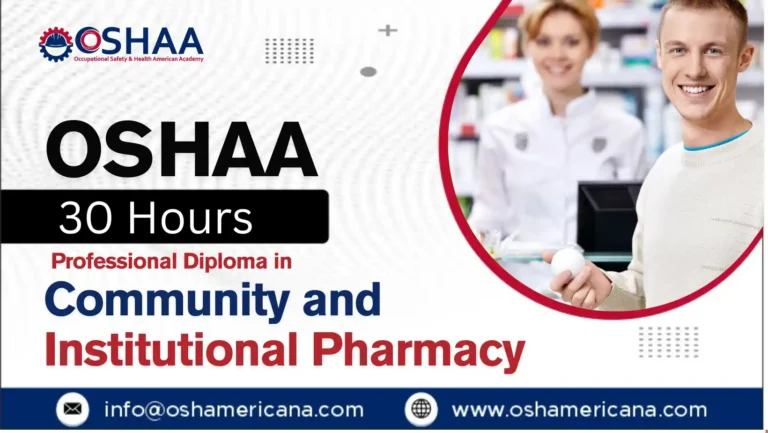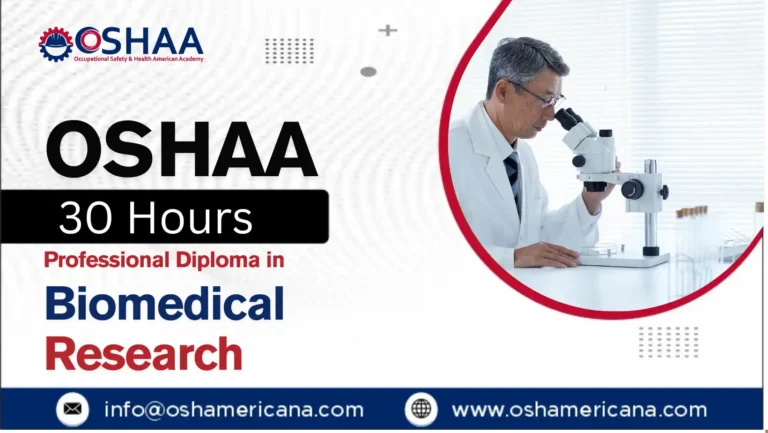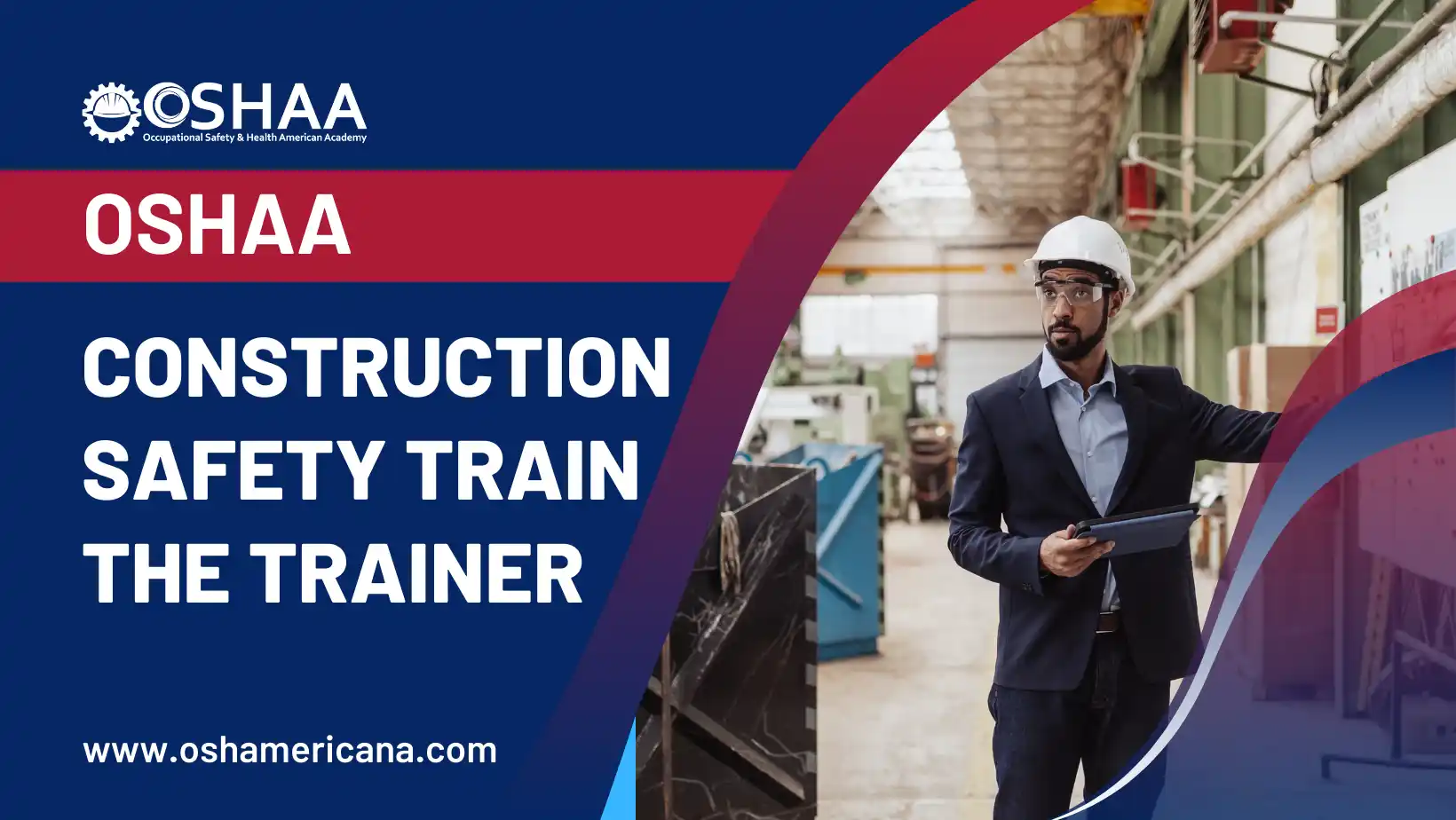Substance misuse is a growing public health concern, affecting individuals, families, and communities. Outreach workers play a vital role in providing support, guidance, and intervention to those struggling with substance misuse. The OSHAA 30-Hours Diploma in Substance Misuse Outreach Worker Training equips participants with essential knowledge and practical skills to work effectively in this challenging yet rewarding field.
Substance misuse outreach workers provide frontline support to individuals dealing with drug and alcohol addiction. Their role involves offering advice, harm reduction strategies, referrals to treatment services, and emotional support. By engaging with individuals in diverse settings, including homeless shelters, rehabilitation centres, and community organizations, outreach workers help bridge the gap between vulnerable individuals and essential services.
This diploma is designed to provide a comprehensive understanding of substance misuse, its causes, and its impact on individuals and society. The course explores practical intervention techniques, harm reduction strategies, and the legal and ethical considerations of working in this field.
The OSHAA 30-Hours Diploma in Substance Misuse Outreach Worker Training is an essential qualification for those committed to making a difference in the lives of individuals affected by substance misuse. Whether you are starting a career in addiction support or looking to expand your knowledge in the field, this course offers the skills and insights needed to provide effective outreach and intervention.
OSHAA 30-Hours Diploma in Substance Misuse Outreach Worker Training
Study Units
Learning Outcomes
Introduction to Substance Misuse and Addiction (4 Hours)
- Understand the definition and key concepts of substance misuse and addiction
- Explore different types of substances and their classifications
- Identify the stages of addiction and patterns of substance use
- Recognise the impact of addiction on individuals, families, and communities
Psychological and Social Factors of Substance Misuse (4 Hours)
- Understand the psychological and behavioural aspects of addiction
- Identify social and environmental factors influencing substance misuse
- Explore the role of trauma, mental health conditions, and peer influence in addiction
- Learn about stigma and barriers to seeking help for substance misuse
Effects of Substance Misuse on Physical and Mental Health (3 Hours)
- Understand the short-term and long-term health effects of different substances
- Recognise the link between substance misuse and mental health disorders
- Explore the neurological and cognitive impact of addiction
- Identify symptoms and warning signs of substance-related health complications
Harm Reduction Strategies and Intervention Techniques (4 Hours)
- Learn key harm reduction principles and their role in addiction support
- Understand different intervention approaches, including motivational interviewing
- Explore strategies for minimising risks associated with substance misuse
- Develop skills for supporting individuals at different stages of recovery
Communication and Engagement Skills in Outreach Work (4 Hours)
- Develop effective communication techniques for engaging with vulnerable individuals
- Learn active listening and non-judgmental support strategies
- Understand how to build trust and rapport with service users
- Explore techniques for motivational interviewing and behavioural change
Safeguarding and Ethical Considerations in Substance Misuse Support (3 Hours)
- Understand safeguarding principles and legal responsibilities in outreach work
- Learn how to identify and report safeguarding concerns
- Explore ethical challenges in substance misuse support and professional boundaries
- Recognise the importance of confidentiality and informed consent
Referral Pathways and Multi-Agency Working (4 Hours)
- Understand the role of different services in substance misuse support
- Learn how to navigate referral pathways and signpost individuals to appropriate services
- Explore the benefits of multi-agency collaboration in addiction recovery
- Recognise the challenges and best practices in coordinating care for service users
Managing Crisis Situations and Challenging Behaviours (4 Hours)
- Learn techniques for de-escalating crisis situations in outreach settings
- Understand how to manage aggression, withdrawal symptoms, and overdose risks
- Develop problem-solving skills for responding to emergencies
- Explore self-care strategies for professionals working in high-stress environments
- Comprehensive Understanding of Substance Misuse
Gain in-depth knowledge of addiction, its causes, and its impact on individuals and communities. - Enhanced Outreach and Support Skills
Develop practical techniques for engaging and supporting individuals struggling with substance misuse. - Effective Harm Reduction and Intervention Strategies
Learn how to minimise risks, provide early intervention, and promote recovery-focused approaches. - Improved Communication and Engagement Techniques
Build trust with service users through active listening, motivational interviewing, and non-judgmental support. - Awareness of Psychological and Social Factors
Understand the link between substance misuse, mental health conditions, trauma, and social influences. - Knowledge of Safeguarding and Ethical Practices
Learn how to identify and respond to safeguarding concerns while maintaining professional boundaries. - Understanding of Referral Pathways and Multi-Agency Collaboration
Gain insights into the available support services and learn how to navigate referral systems effectively. - Crisis Management and Problem-Solving Skills
Develop the ability to handle challenging behaviours, de-escalate crises, and support individuals in high-risk situations. - Career Progression in Social Care and Addiction Support
Improve employability in outreach work, rehabilitation services, mental health support, and community-based initiatives. - Positive Community Impact
Contribute to reducing substance-related harm and promoting recovery-focused support within communities.
This course provides essential skills and knowledge for professionals and volunteers looking to make a meaningful difference in the lives of individuals affected by substance misuse.
This course is designed for individuals who want to develop their knowledge and skills in supporting people affected by substance misuse. It is ideal for:
- Aspiring Outreach Workers – Those looking to start a career in substance misuse support and intervention.
- Social Workers and Counsellors – Professionals working in social care and mental health settings who want to expand their expertise in addiction support.
- Community and Youth Workers – Individuals supporting vulnerable populations and at-risk youth who may be affected by substance misuse.
- Healthcare Professionals – Nurses, therapists, and other medical staff involved in addiction treatment and rehabilitation services.
- Volunteers and Charity Workers – Individuals working with non-profit organisations, homeless shelters, and harm reduction initiatives.
- Law Enforcement and Criminal Justice Personnel – Police officers, probation officers, and prison staff dealing with substance-related cases.
- Teachers and Education Staff – Educators who want to better understand the challenges faced by students affected by substance misuse.
- HR Professionals and Workplace Wellbeing Officers – Those responsible for managing employee wellbeing and addressing substance misuse in the workplace.
- Students and Career Changers – Individuals interested in pursuing a career in addiction support, social care, or mental health services.
This diploma is suitable for anyone passionate about supporting individuals affected by substance misuse and making a positive impact on society.

